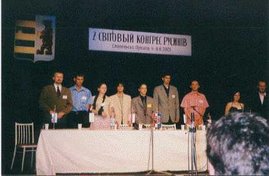 Radio Praha [13-03-2008 15:03 UTC] By Dominik Jůn
Radio Praha [13-03-2008 15:03 UTC] By Dominik Jůn Czech lawmakers have recommended that people forced to abandon their homes in Carpathian Ruthenia, when this part of Czechoslovakia was ceded to the Soviet Union at the end of WWII, be compensated. Estimates suggest that this may cost the Czech government as much as 1 billion crowns.
In 1945, at the end of WWII, Czechoslovakia regained about a third of its territory. The Sudeten regions, annexed by Nazi Germany in 1938, were formally returned to Czechoslovakia and the country’s original borders were restored. But a lesser known fact is that the country also lost part of its territory, a region known as Carpathian Ruthenia or Sub-Carpathian Rus. This territory stretched from what is the present-day eastern border of Slovakia, eastward along the Carpathian Mountains.
The sub-Carpathian region became part of Czechoslovakia when the country declared its independence from the Austro-Hungarian Empire in 1918. At that time, the region was populated mostly by Ruthenians, with a small German and Hungarian population also present. In addition, there was also a tiny Czech and Slovak population, numbering less than 10,000 people. During the First Republic, Carpathian Ruthenia received substantial infra-structure investment from Prague, with new roads and railways aiding the economy of this still backward region. After the invasion of the Czech lands in 1939 by Nazi Germany, and only a day after Slovakia declared its own independence from Czechoslovakia and allied itself with Nazi Germany, the region declared independence as the Republic of Carpath-Ukraine. But its independence proved fleeting - 24 hours later, it was invaded and annexed by Hungary, an ally of Nazi Germany.
In 1944, invading Soviet troops, refused to return control of the area to the Czech authorities, and in June 1945, Czechoslovakia was forced to cede the territory to the Soviet Union. It then became part of the Ukrainian Soviet Socialist Republic. Around this time, most of the Czech and Slovak inhabitants living in the region fled the territory. At present, the region remains part of Ukraine.
The current proposals put forth collectively by the Civic and Social Democrats along with the Czech Communist party seek to compensate those that were forced to abandon their properties and possessions and flee to Czechoslovakia in 1945. The legislation recommends a maximum compensation of two million crowns to be given to either individual survivors or their families. For compensation to be received, the families must prove the value of lost property, something the government has insisted is still documented in the national archives.
Although the number of survivors directly affected by this proposal is relatively small, it is still viewed by the government as a just attempt to compensate Czechs dispossessed from their country of origin.



 Il'ko: I don't believe that Rusyns from all over the world came to the World Congress. And where in Romania could they find such a big bar?
Il'ko: I don't believe that Rusyns from all over the world came to the World Congress. And where in Romania could they find such a big bar?







